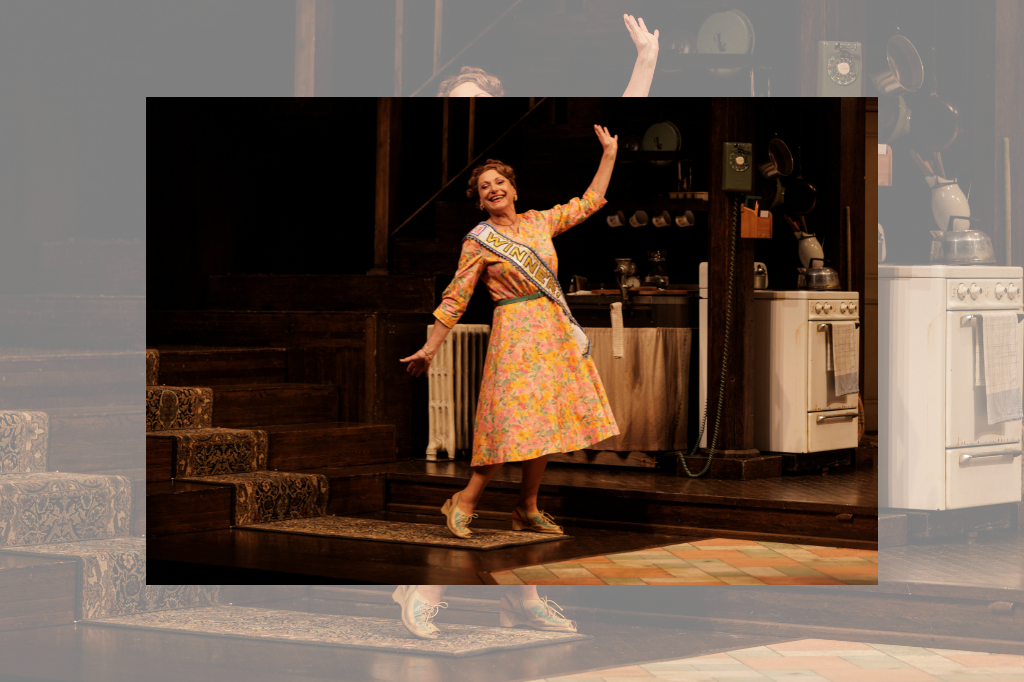REVIEW: Stratford Festival’s attractive Les Belles-Soeurs makes meaning of dated translation
Germaine Lauzon is a big winner, and she wants you to know about it.
It’s the 1960s in Montreal, and Germaine, played with unapologetic sass by Lucy Peacock, has won a major prize – 1,000,000 stamps, which when pasted into special booklets entitle her to all the treasures of a local variety store. The stamps are her ticket out of the working class, she tells us. She’ll buy herself a whole new set of furniture and appliances, and maybe even a new house to store them.
But first, she has to enlist the help of her friends and neighbours to paste the stamps. No small feat, it turns out, as the invitees pillage the stamps for themselves, laughing.
Michel Tremblay’s play about working-class Quebec and the women holding it up has stood the test of time. First produced in 1968, the play wrestles with the notion of entitlement – who deserves nice things, and why do they deserve them more than anyone else? – and uses 15 down-on-their-luck Quebecois women to explore the underbelly of society, a faction otherwise underexplored in Canadian dramaturgy before Tremblay’s script arrived on the scene.
Translated from French into English by John Van Burek and Bill Glassco, Les Belles-Soeurs is a timely, tragic play. But the Stratford Festival’s production perhaps reveals the cracks in Van Burek and Glassco’s translation: the dated language at times feels stilted in the mouths of the actors. Director Esther Jun has put together a visually pleasing, well-paced production, but the actors frequently fall in and out of Quebecker accents, further signalling that it might be time for a new adaptation of the work, with less of a wall between the words being spoken and the ideas being developed inside Germaine’s kitchen.
Still, not all is lost – much of the supporting cast of Les Belles-Soeurs is excellent, particularly Seana McKenna as the crotchety (but ultimately deeply sympathetic) Rose Ouimet. Allison Edwards-Crewe is a knockout Pierette, the nightclub singer whose life choices have landed her in the centre of local gossip. Marissa Orjalo as Lise and Tara Sky as Ginette make short, but memorable appearances at the stamp-pasting party, bringing commendable nuance and depth to two underwritten characters, the young women doomed to follow in the footsteps of their under-achieving mothers and grandmothers.
Ultimately, Stratford’s is a fine Les Belles-Soeurs, with lovely-as-ever costumes by Michelle Bohn and an attractive set by Joanna Yu, which feels alive with the sombre history of the women onstage thanks to its vast, dusty collection of tchotchkes and other bric a brac. Jun’s blocking and Yu’s set don’t always play nice together – there are several prolonged scenes in which Germaine’s friends sit around tables and don’t move, which makes for sightline issues regardless of where you sit inside the cavernous Festival Theatre – but for the most part, the scenography of the production works to suggest the oppression of life in the lower-to-middle class. The choice to stage this play in such a large space confounds me – Jun’s production could be much more resonant in a more intimate arena – but for the most part, the team has managed to compensate for a compact story with a dynamic, meticulous stage picture.
Les Belles-Soeurs is among the most important plays in French Canadian theatre history: for the original’s foray into joual, yes, but also for its brave depiction of working-class women at their ugliest. I’m of the opinion the English translation is in dire need of a revamp, but as it stands, the Stratford production of Tremblay’s opus gets the job done, honouring the play’s significance with some terrific performances from Festival favourites and newcomers alike.
Les Belles-Soeurs runs at the Stratford Festival until October 28. Tickets are available here.
Intermission reviews are independent and unrelated to Intermission’s partnered content. Learn more about Intermission’s partnership model here.















Comments